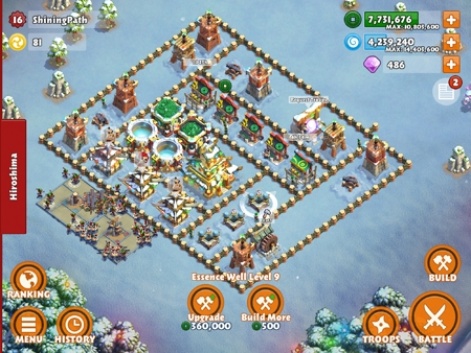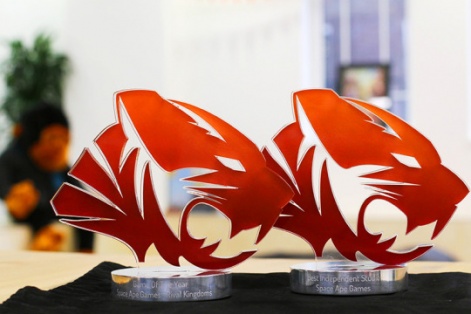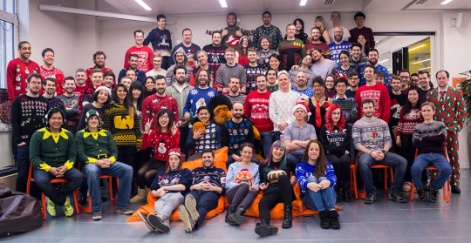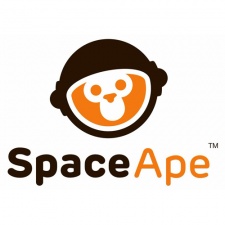Responsible for Samurai Siege and Rival Kingdoms, London-based startup Space Ape Games has wasted no time in establishing itself as a studio worth keeping a close eye on - particularly in the strategy genre.
The aforementioned titles have gathered substantial attention, and it's been achieved through quality - we praised Rival Kingdoms for its smooth UI and light monetisation, while a recent public vote via trade body TIGA saw the firm named the UK's best independent studio.
Now, as revealed in our end-of-year interview with COO and co-founder Simon Hade, the firm is "looking to hire 50 new employees in the next 12 months."
So we got in touch with Hade to learn more about the sort of candidates Space Ape is encouraging to apply, insights into company culture, and tips for anyone wanting to break into the industry.
If you're at all interested in working for what is - officially - the UK's best indie studio, then take note of his responses.
PocketGamer.biz: Could you give us some background on Space Ape Games and what you do?
Simon Hade: Space Ape is an award winning mobile/social gaming startup founded in 2012 and based in central London. We’re dedicated to bringing handcrafted games that millions of people worldwide will love and enjoy.

Our team is comprised of a diverse, highly talented and experienced group of game makers from 27 different countries, with a focus on the community and delivering a rich, quality gameplay experience to players.
Our priority is going from 3 game teams to 5, which means we need a few more great client devs.Simon Hade
Space Ape is a studio founded by industry veterans: John Earner (formerly GM of Playfish, Sony PlayStation and BCG), Simon Hade (formerly responsible for monetisation at Skype and Electronic Arts) and Toby Moore (CTO of Moshi Monsters’ creator Mind Candy for 6 years).
We are big believers in developing a culture that nurtures both creative and analytical sides of game development.
What specific areas/disciplines are you currently hiring in?
Our priority right now is going from 3 game teams to 5, which means we need a few more great client developers.
We’re a Unity shop, but really push the platform to the limit with custom work and very sophisticated backend systems, so we’re looking for people who can bring a lot of inspiration and imagination to the gameplay development but are also very accomplished technically.
We also need more QA engineers and game designers and we have about 10 open roles across various disciplines on our jobs page.
As you're overseeing recruitment at Space Ape, what do you look for in candidates?
When we talk to someone about joining Space Ape, we always as a team ask ourselves whether they are passionate, productive, team players.
We run very small autonomous teams, and give our frontline game developers (and product managers, designers, art leads etc.) a ton of freedom to make the game they want to make and how they want to make it.
This means people need to really own their work, love what they do, and have extremely high output.
It also means they really want to work in an environment where they can have an immediate impact on the business, not be micro-managed as well as grow and learn new things as the company grows, even if that means taking their career in a different direction.

That can be scary for some people, exhilarating and liberating for others. The latter tend to find their way to us.
Historically we’ve only hired more experienced game developers who are generalists, able to do one thing extremely well, but also a couple of other things better than most.
People usually develop this outlook through pattern recognition of many game launches and operating live games, we’ve tended to hire more experienced people - on average people have about 7 years experience making free-to-play and often just on mobile.
However, we also have a few junior people who are really badass at one specific thing and a hunger to learn more.
The great thing about being a 100-person company is we have the infrastructure to support ongoing development and learning, especially as the business grows and there are always new opportunities to chase; and we’re small enough that individuals in any role can have a massive impact on the business.
We’ve managed to retain what made Space Ape a great place to work when it was 15 people, at 100. It's a rare thing.Simon Hade
So we’re finding these days we filter less on experience and more on things like passion, productivity and teamwork - and that can take many forms.
Why do you think Space Ape/London is a good place to work? How will you be trying to encourage a strong company culture?
Game development is a team sport and you need a lot of trust, respect and people with the same kind of ambition to learn and to win.
That trust and respect generally only comes with time working together and is easily lost if the company doesn’t explicitly make it a top priority.
So we focus a lot on keeping teams together across multiple projects, making sure the chemistry is right between people on the teams and being very transparent about what is working well and when we need to make changes.
Everyone at Space Ape has stock in the company, and has a very clear vision for where we want to be.
We might - and often do - debate about how best to execute that mission, whether we make this game or that, or use this tech or that, but there is never ever a time when you wonder if someone has some agenda, which so often happens as companies get big.
So we’ve managed to retain what made Space Ape a great place to work when it was 15 people, at 100, and in fact I think the culture is better at 100 people than 15, which is a very rare thing.
We do this by obsessing about transparency and autonomy. Everyone knows every stat about the whole of the business.
We are constantly sharing - via formal show and tells and weekly sessions, to more informal gatherings of “guilds” of people across different teams - to ensure transparency is there in everything we do; and because people are armed with all the facts we can trust them to make the right decisions and take a lot of responsibility for their area.
Finally, we strive to keep teams as small as possible - so we’re not really a 100 person company but more like a federation of 4 or 5 smaller companies each running their own game - but with the infrastructure and support of a larger organisation that we didn’t have when we were a 15 person startup working on one game.
And of course we set a really high bar for hiring, and put a lot of effort into ensuring we have events at the office. There is a big gaming culture here in the office and the kitchen’s well-stocked etc.
But all of that complements culture; it doesn’t create it. Our culture comes from everyone buying into the mission and being armed - whether that is with tech, people, or the trust of management - to go figure out how best to execute that mission and have a real and direct impact on the business.
If you get that right you don’t need a fridge full of beer or foosball tables and a fancy office to have a great culture - though we have all that too.
As for why London - it’s a Goldilocks zone for games development.
You have this rich 30-year heritage of highly creative games development, a powerful alumni from some of the pioneering companies from the last generation of free-to-play gaming, and an abundance of great technical talent if different sectors - fintech is a great source of talent for example.
Why would you spend your days coding trading or remittance platforms and go home and play games all weekend as your passion - when you can work on games during the day on tech that is equally if not more challenging.
London is a Goldilocks zone for games development.Simon Hade
London is also very international. We have people from 27 nationalities, which is essential when you’re operating a global business where China and Japan are your number 2 and 3 market.
What advice would you have for someone trying to get into the games industry?
First decide, do you want to go to a big or small studio? Ask yourself is it more important for you to develop technically in your craft or get life experience of building and operating games?
If the former then you may need to look for advertised roles in more established companies and think of those roles more like extended training. I have no secret tips for going down that route frankly, and believe in most cases the latter is the right answer.
As a general rule we value a few years at a small credible company that had potential where a candidate was exposed to many different challenges and learned a lot, than someone who was a small cog in a bigger machine.
You just tend to grow more, meet more interesting people, and do more interesting work in smaller studios.

Then you need a plan how to land the job. Spamming the jobs email or going through recruiters should be a last resort.
Does the company host events that you can join and meet people? Can you get in touch with their community team as a player? Network your way in and become known to the company and be willing and able to do anything to get in the door.
Some people here have joined through our CS and community department, or started in QA and then moved onto design or marketing.
Some started work as volunteer moderators or made YouTube videos about our games, or sent in feedback.
You don’t need to compromise - work on games you love to play.Simon Hade
If you find a company that you think is going places, prioritise getting in the door vs. getting the perfect job description. If they do then it will grow and opportunities open up.
And never, ever, ever go for a job interview (or even apply for a job) unless you have played their games and can talk passionately about their product.
If you cannot manage to at least fake an interest in a potential employer’s games, you’re in the wrong business. Life’s too short to do things you’re not passionate about, and there are so many varied options in gaming you don’t need to compromise - work on games you love to play.
More details on Space Ape's current vacancies can be found on its jobs page.





















